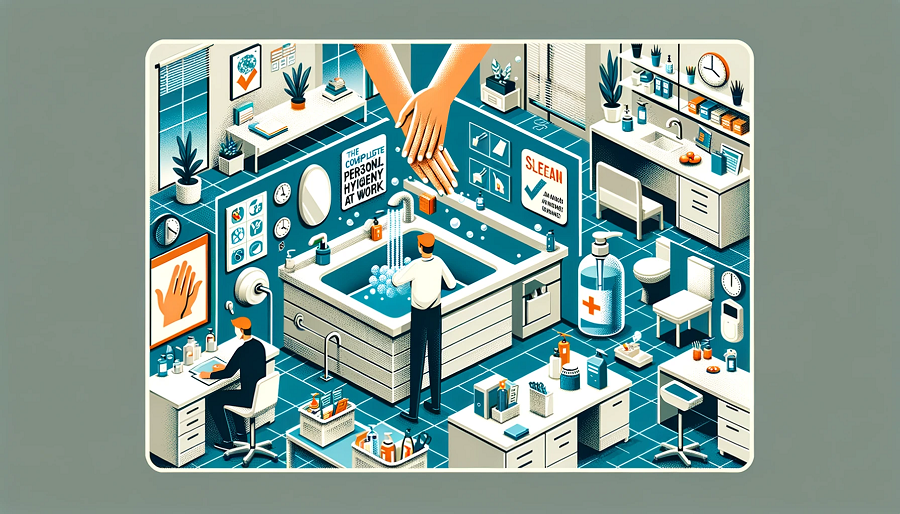Hygiene at Work: In today’s dynamic work landscape, the importance of hygiene and cleanliness extends far beyond our personal spaces and daily routines. From our morning commutes to our workstations, and even to the broader psychological impact of a clean workplace, hygiene has become a critical factor in fostering a safe, productive, and thriving professional environment. The ongoing COVID-19 pandemic has further emphasized the significance of these practices, prompting us to adapt and evolve our hygiene habits to ensure the well-being of ourselves and our colleagues. In this comprehensive exploration, we will delve into the intricacies of workplace hygiene, offering practical tips and insights to guide us through our daily routines, as well as an understanding of the profound influence that cleanliness has on our professional lives.
The Significance of Workplace Hygiene: Cleanliness for Success
Workplace hygiene is not just about looking good; it’s about creating a healthy and productive work environment. A clean and hygienic workspace is the foundation of professionalism, contributing to both personal well-being and professional success. In this article, we’ll explore the significance of workplace hygiene and delve into the specifics of hand hygiene, face and body hygiene, and how dressing appropriately ties it all together.
The Significance of Workplace Hygiene
Workplace hygiene encompasses a range of practices aimed at maintaining cleanliness in your work environment. It goes beyond just keeping your desk organized or washing your hands regularly. Workplace hygiene involves maintaining a clean and healthy workspace, practicing good personal hygiene, and dressing appropriately for your job.
The significance of workplace hygiene cannot be overstated. It directly impacts your professional image, physical health, and the overall atmosphere in your workplace. Here’s why it matters:
- Professional Image: Your personal hygiene and the cleanliness of your workspace are reflections of your professionalism. Colleagues, superiors, and clients form opinions about you based on these factors. A well-groomed and hygienic appearance demonstrates your commitment to your job and respect for those around you.
- Health and Well-Being: Good workplace hygiene reduces the risk of illnesses spreading within the office. Regular handwashing and cleanliness practices can help prevent the transmission of germs and reduce absenteeism due to sickness.
- Productivity and Comfort: A clean and organized workspace promotes efficiency and minimizes distractions. When you work in a clutter-free environment, you can focus better on your tasks, leading to improved productivity and job satisfaction.
Hand Hygiene: The First Line of Defense
Hand hygiene is the cornerstone of workplace hygiene. It is the first line of defense against the transmission of germs and illnesses. Consider these essential hand hygiene practices:
- Handwashing: Wash your hands frequently with soap and water for at least 20 seconds. This simple act can significantly reduce the risk of infection. Singing “Happy Birthday” twice can serve as a helpful timer.
- Hand Sanitizers: When soap and water are not readily available, use hand sanitizers containing at least 60% alcohol. Apply enough sanitizer to cover all surfaces of your hands, and rub them together until they are dry.
- High-Touch Surfaces: Be mindful of frequently touched surfaces like doorknobs, elevator buttons, and shared office equipment. Regularly disinfect these surfaces to prevent the spread of germs.
Cleanliness Beyond Hands: Face and Body Hygiene
While hand hygiene is vital, personal cleanliness extends beyond your hands. Here are some essential tips for maintaining face and body hygiene:
- Regular Showers: Showering daily helps keep your body clean and refreshed. Use a mild soap and shampoo to cleanse your skin and hair.
- Oral Hygiene: Maintain good oral hygiene by brushing your teeth at least twice a day and using dental floss. Fresh breath and a clean smile are essential for professional interactions.
- Nail Care: Keep your nails clean and trimmed to prevent dirt and bacteria buildup. Long nails can harbor germs and make hand hygiene less effective.
Dressing for Success and Hygiene
Dressing appropriately for your job not only conveys professionalism but also plays a significant role in workplace hygiene. Here’s how to combine style and cleanliness:
- Clean and Well-Fitted Clothing: Wear clean, well-fitted clothes that are appropriate for your workplace. Wrinkled, stained, or ill-fitting attire can detract from your professional image.
- Minimal Fragrance: Avoid strong perfumes or colognes, as they can trigger allergies or sensitivities in coworkers. Opt for subtle scents or skip them altogether.
Maintaining a Hygienic Workplace: From Personal Space to Common Areas
In the modern workplace, hygiene goes beyond just personal cleanliness; it extends to your surroundings and shared spaces. Personal space and workspace hygiene, as well as proper kitchen and food hygiene at work, are essential components of maintaining a clean and healthy work environment. In this article, we’ll explore the importance of these aspects and provide practical tips for ensuring a hygienic workplace.
Personal Space and Workspace Hygiene
Your personal space at work, including your desk and immediate surroundings, plays a crucial role in your overall workplace hygiene. Here’s why it’s essential:
- Efficiency and Productivity: A clean and organized workspace enhances your efficiency and productivity. Clutter can be distracting and reduce your ability to focus on tasks.
- Professional Image: Your workspace reflects your professionalism. A tidy desk and well-kept surroundings convey a sense of responsibility and competence to your colleagues and superiors.
- Health and Well-Being: Maintaining a clean workspace reduces the risk of illness transmission. Regular cleaning and disinfecting of surfaces can help prevent the spread of germs.
Now, let’s delve into some practical tips for maintaining personal space and workspace hygiene:
Keeping Your Desk Clean:
- Regularly wipe down your desk with disinfectant to remove germs and dirt.
- Keep personal items organized and minimize clutter.
- Use cable organizers to manage cords and prevent dust buildup.
- Clean your computer keyboard, mouse, and phone regularly, as they are high-touch areas.
- Dispose of waste properly in designated bins.
Workspace Organization:
- Use storage solutions like shelves, drawers, and filing cabinets to keep your workspace organized.
- Label and categorize items to easily locate what you need.
- Establish a cleaning routine for your workspace, including wiping down surfaces and sanitizing shared equipment.
Kitchen and Food Hygiene at Work
Many workplaces provide kitchen facilities for employees to prepare and store food. Proper kitchen and food hygiene are crucial for everyone’s health and well-being. Here’s why it matters:
- Food Safety: Proper food handling and storage prevent foodborne illnesses. Contaminated food can lead to gastrointestinal problems and sickness.
- Cleanliness and Odor Control: Maintaining a clean kitchen area ensures a pleasant and odor-free workspace. Food spills and residue can attract pests and create an unpleasant environment.
Now, let’s explore some tips for maintaining kitchen and food hygiene at work:
Food Storage:
- Label and date items in the refrigerator to prevent the growth of mold and bacteria.
- Dispose of expired or spoiled food promptly.
- Store food in airtight containers to prevent cross-contamination and maintain freshness.
Food Preparation:
- Wash your hands thoroughly before handling food.
- Use separate cutting boards for raw meats and other ingredients.
- Clean kitchen utensils, dishes, and countertops after use.
Shared Facilities: Bathrooms and Common Areas
Shared facilities, such as bathrooms and common areas, are high-traffic areas in the workplace. Maintaining hygiene in these spaces is essential for everyone’s comfort and well-being. Here’s why shared facility hygiene is crucial:
- Preventing Disease Spread: Bathrooms and common areas can harbor germs and bacteria. Proper cleaning and hygiene practices reduce the risk of illness transmission.
- Creating a Positive Environment: A clean and well-maintained workplace common area contributes to a positive atmosphere and employee satisfaction.
Now, let’s discuss some tips for maintaining hygiene in shared facilities:
Bathrooms:
- Always flush toilets after use, and make sure they are functioning correctly.
- Wash your hands thoroughly with soap and water, and use hand sanitizers if available.
- Dispose of used paper towels and other waste in designated bins.
- Report any maintenance issues, such as leaks or broken fixtures, promptly.
Common Areas:
- Clean up after using common areas, such as meeting rooms or break rooms.
- Dispose of trash and recyclables in the appropriate bins.
- Respect shared equipment and spaces, keeping them clean and in good condition.
Navigating the Commute with Cleanliness: Tips for a Fresh Start
Your daily commute sets the tone for your workday. Whether you’re driving, taking public transportation, or walking to the office, maintaining hygiene during your commute is essential. In this article, we’ll explore tips for a clean start to your workday, discuss the psychological impact of workplace hygiene, and address the evolving landscape of workplace hygiene in the age of COVID-19.
Hygiene and the Commute: Tips for a Clean Start
The cleanliness of your commute can significantly impact your comfort and well-being throughout the day. Here are some essential tips for maintaining hygiene during your journey to work:
1. Hand Hygiene:
- Start your day by washing your hands with soap and water before leaving home. This simple step can help reduce the transmission of germs during your commute.
- Carry a small bottle of hand sanitizer containing at least 60% alcohol for on-the-go hand hygiene. Use it when soap and water are not readily available.
2. Tissues and Wipes:
- Keep tissues or disinfecting wipes handy during your commute. They can be used to clean your hands, sanitize surfaces, or handle public transportation equipment.
- Use a tissue or your elbow to cover your mouth and nose when coughing or sneezing to prevent the spread of germs.
3. Face Masks:
- In the era of COVID-19, wearing a mask during your commute is crucial for your safety and the safety of others. Follow local guidelines and mask mandates.
- Ensure your mask covers both your nose and mouth, and replace it if it becomes damp or soiled.
4. Personal Items:
- Carry a reusable bag for your personal items, such as your laptop, lunch, or gym clothes. This prevents them from coming into direct contact with potentially contaminated surfaces.
- Keep your personal items organized and separate from items like groceries or shoes that may carry dirt or germs.
The Psychological Impact of Workplace Hygiene
Workplace hygiene isn’t just about physical cleanliness; it also has a significant psychological impact. A clean and well-maintained workspace fosters a positive environment and influences your overall mental state. Here’s how:
1. Reduced Stress and Anxiety:
- A clutter-free and clean workspace reduces distractions and promotes a sense of control, leading to lower stress levels and decreased anxiety.
- Knowing that you’re in a clean and safe environment can alleviate concerns about health and well-being, contributing to a more relaxed mindset.
2. Improved Morale and Productivity:
- A hygienic workplace enhances employee morale, job satisfaction, and overall happiness. When you feel comfortable and secure in your surroundings, you’re more likely to be productive and engaged in your work.
- A clean workspace also promotes a positive image of your workplace, attracting and retaining talented employees.
3. Enhanced Collaboration:
- In a clean and organized workspace, employees are more inclined to collaborate and communicate effectively. Clutter-free common areas facilitate interactions, leading to better teamwork and innovative ideas.
Workplace Hygiene in the Age of COVID-19
The COVID-19 pandemic has brought heightened awareness of workplace hygiene and safety. Employers and employees must adapt to new norms to ensure a clean and secure work environment. Here are some considerations for workplace hygiene in the age of COVID-19:
1. Social Distancing:
- Maintain a safe distance from coworkers in shared spaces, such as meeting rooms and break areas.
- Follow office guidelines for seating arrangements and occupancy limits.
2. Enhanced Cleaning Protocols:
- Offices should implement more frequent cleaning and disinfection of common areas, surfaces, and high-touch points.
- Employees can also contribute by regularly sanitizing their workstations and shared equipment.
3. Remote Work:
- Some workplaces have adopted remote work as a long-term solution. Ensure your home workspace is clean and conducive to productivity.
- Collaborate virtually to minimize in-person interactions, when possible.
Final Thoughts:
Hygiene at Work: In a world where the importance of hygiene has never been more evident, our journey through workplace cleanliness has offered valuable insights and practical guidance. From maintaining a clean commute to understanding the profound psychological impact of workplace hygiene and adapting to the evolving demands of a post-COVID-19 world, we’ve explored every facet of this critical topic. As we conclude this comprehensive exploration, let’s remember that hygiene is not merely a routine; it’s a collective responsibility that shapes our professional lives. By embracing the practices outlined in this guide, we can build a healthier, more productive, and safer work environment for ourselves and those around us. So, let’s continue to prioritize workplace hygiene and embark on a path to a cleaner, brighter, and more successful professional future.
FAQs
1. Why is Hygiene at Work important?
- Workplace hygiene is essential for maintaining a healthy and productive work environment. It reduces the risk of illness transmission, enhances professionalism, and contributes to overall well-being.
2. What are the key components of personal Hygiene at Work?
- Key components include keeping your desk clean and organized, regular disinfection of surfaces, proper storage of personal items, and maintaining good hand hygiene.
3. How can I maintain hygiene during my daily commute?
- You can maintain hygiene during your commute by washing your hands before leaving home, carrying hand sanitizer, using tissues or wipes, wearing a mask (especially during COVID-19), and keeping personal items separate and organized.
4. What is the psychological impact of workplace hygiene?
- Workplace hygiene can reduce stress and anxiety, improve morale and productivity, and enhance collaboration and teamwork. A clean and organized workspace promotes a positive mindset and work atmosphere.
5. How has COVID-19 impacted Hygiene at Work?
- COVID-19 has led to increased awareness of workplace hygiene. It has resulted in enhanced cleaning protocols, social distancing measures, remote work options, and the use of personal protective equipment (PPE) like masks and sanitizers.
6. What can employees do to contribute to Hygiene at Work during the pandemic?
- Employees can contribute by following office hygiene guidelines, practicing good hand hygiene, maintaining social distance, cleaning their workstations, and staying informed about COVID-19 policies.
7. How can employers promote Hygiene at Work?
- Employers can promote workplace hygiene by implementing regular cleaning and disinfection, providing hand sanitizers and masks, enforcing social distancing measures, and offering flexible work arrangements when possible.
8. What is the best way to clean and sanitize shared office equipment?
- The best way to clean and sanitize shared office equipment is to use disinfecting wipes or sprays containing at least 60% alcohol. Wipe down surfaces thoroughly and allow them to air dry.
9. How often should common areas like break rooms and bathrooms be cleaned?
- Common areas should be cleaned and disinfected regularly, with a focus on high-touch surfaces. The frequency may vary but should adhere to established cleaning schedules and guidelines.
10. Can a clean workplace really boost productivity and morale?
- Yes, a clean workplace can have a positive impact on productivity and morale. A tidy and organized environment reduces distractions, enhances comfort, and fosters a sense of pride in the workplace, which can lead to increased job satisfaction and productivity.







